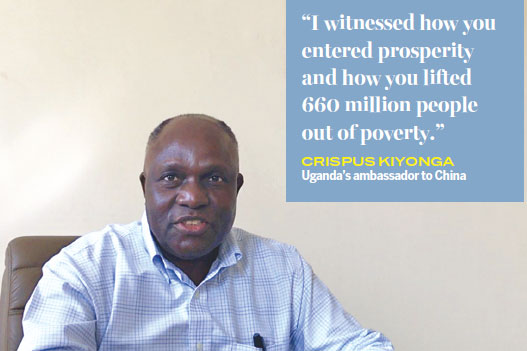China's prosperity benefits Africa, too
Ugandan ambassador says poverty alleviation efforts and achievements by 'old friend' have impressed him the most
Crispus Kiyonga has been Uganda's ambassador to China since late August, but before that he was already very familiar with the country.
He says China is "like an old friend" to him because he has visited the country almost every year since the end of the 1980s.
He has been most impressed by the Communist Party of China's efforts and achievements on poverty alleviation. "Every time I travel to China, I find differences," he says. "I witnessed how you entered prosperity and how you lifted 660 million people out of poverty."

He also praises the five years since the 18th National Congress of the CPC, which he says have seen many achievements in diplomatic, economic and other sectors.
Kiyonga says the prosperity of China benefits Uganda and Africa as a whole, especially with an increasing number of Chinese companies investing in Africa in recent years.
Africa has very rich mineral resources. Uganda has copper, for example, while Kenya has titanium and South Africa has gold. Like many of his fellow African politicians, Kiyonga dislikes the way that some Western companies invest in Africa to "dig the mineral resources, sell them and take the money away without leaving anything to us".
By comparison, Chinese companies build local factories to process the mineral resources. "In that way, African countries get the value-added part", he says. "That in turn boosts local growth."
In addition, many Chinese companies invest in infrastructure construction programs that are mutually beneficial, he says, calling the Karuma Hydroelectric Power Station a typical Chinese investment project. Karuma, now under construction on the Victoria Nile River, will be the largest power-generating installation in the country when finished.
Its generated electricity will provide a stable power source for thousands of local villages. The construction program has provided jobs for at least 4,600 local residents and will help to boost local economic growth.
"The win-win situation of Chinese investment in Africa is based on the general framework of the China-Africa economic relationship," Kiyonga says. "China never attaches any political terms to its economic cooperation and assistance."
At the sixth Forum on China-Africa Cooperation, held in Johannesburg, South Africa, in 2015, President Xi Jinping announced that China would provide $60 billion funding support to Africa, of which $5 billion would be interest-free loans. Kiyonga welcomes the move and says that will boost African growth, which in turn will benefit Chinese consumption and manufacturing.
He Wenping, a professor and director of the Institute of West-Asian and African Studies at the Chinese Academy of Social Sciences, says China can help Africa not only with funding and technology, but also with its experience. "China knows how to turn a poor country into a rich one, which African countries can learn from," she says.
Li Xinfeng, deputy director of social sciences at China Press as well as an expert on African studies, wrote in a comment piece in People's Daily that Chinese investment will help Africa "accelerate its industrialization, enhance the construction of infrastructure and strengthen its capability of independent development".
Oct 9 marked the 55th anniversary of Uganda's independence as well as its establishment of diplomatic relations with China. Kiyonga says his country could play a bigger, more positive part in China-Uganda trade by balancing its trade deficit. "Last year, China exported goods worth $800 million to Uganda, but the latter only exported goods worth $40 million to China," he says. "But we have tourism."
"China has a population of 1.4 billion, which is an extremely large tourism market", he says. "If tourism to Uganda and Africa as a whole becomes more popular, that will mean a bigger cake for the latter".
Wang Han contributed to this story.
























